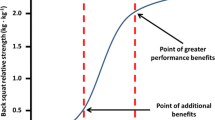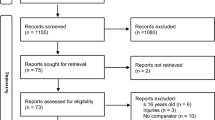Abstract
Purpose
Research on whether caffeine habituation reduces its ergogenicity is scarce and conflicting. The purpose of the present study was to examine the influence of habitual caffeine consumption on exercise performance and biological responses during a simulated soccer-game protocol following acute caffeine ingestion.
Methods
Twenty professional male soccer players were categorized as higher (n = 9) or lower caffeine consumers (n = 11) after answering a validated questionnaire. Participants performed a simulated treadmill soccer-game protocol on treadmill following either caffeine (6 mg kg−1) or placebo ingestion, during which several variables were evaluated.
Results
Time to exhaustion, countermovement jump height, mean arterial pressure, heart rate, plasma glucose, and lactate were higher (P ≤ 0.001), while rating of perceived exertion (RPE) was lower (P = 0.002), following caffeine compared to placebo ingestion, with no differences between groups (P > 0.05). Plasma non-esterified fatty acids exhibited a higher response to caffeine in the higher vs lower caffeine consumers. Reaction time, plasma glycerol and epinephrine, carbohydrate and fat oxidation, and energy expenditure were not affected by caffeine (P > 0.05).
Conclusion
Caffeine ingestion largely improved cardiovascular and neuromuscular performance, while reducing RPE, in both higher and lower caffeine consuming athletes during prolonged intermitted exercise to exhaustion.




Similar content being viewed by others
References
Grgic J, Mikulic P, Schoenfeld BJ, Bishop DJ, Pedisic Z (2019) The influence of caffeine supplementation on resistance exercise: a review. Sports Med 49(1):17–30. https://doi.org/10.1007/s40279-018-0997-y
Guest NS, VanDusseldorp TA, Nelson MT et al (2021) International society of sports nutrition position stand: caffeine and exercise performance. J Int Soc Sports Nutr. https://doi.org/10.1186/s12970-020-00383-4
Lane SC, Hawley JA, Desbrow B, Jones AM et al (2014) Single and combined effects of beetroot juice and caffeine supplementation on cycling time trial performance. Appl Physiol Nutr Metab 39(9):1050–1057
Guest N, Corey P, Vescovi J, El-Sohemy A (2018) Caffeine, CYP1A2 genotype and endurance performance in athletes. Med Sci Sports Exerc. https://doi.org/10.1249/MSS.0000000000001596
Bridge CA, Jones MA (2006) The effect of caffeine ingestion on 8 km run performance in a field setting. J Sports Sci 24(4):433–439
Pérez-López A, Salinero JJ, Abian-Vicen J, Valadés D et al (2015) Caffeinated energy drinks improve volleyball performance in elite female players. Med Sci Sports Exerc 47(4):850–856
Muñoz A, López-Samanes Á, Pérez-López A et al (2020) Effects of caffeine ingestion on physical performance in elite women handball players: A randomized, controlled study. Int J Sports Physiol 15(10):1406–1413
Gant N, Ali A, Foskett A (2010) The influence of caffeine and carbohydrate coingestion on simulated soccer performance. Int J Sport Nutr Exerc Metab 20(3):191–197
Apostolidis A, Mougios V, Smilios I, Frangous M, Hadjicharalambous M (2020) Caffeine supplementation is ergogenic in soccer players independent of cardiorespiratory or neuromuscular fitness levels. J Int Soc Sports Nutr. https://doi.org/10.1186/s12970-020-00360-x
Apostolidis A, Mougios V, Smilios I, Rodosthenous J, Hadjicharalambous M (2019) Caffeine supplementation: ergogenic in both high and low caffeine responders. Int J Sports Physiol Perform 14:650–657. https://doi.org/10.1123/ijspp.2018-0238
Stein JA, Gasier HG, Goodman BD et al (2021) Effects of caffeine on exercise duration, critical velocity, and ratings of perceived exertion during repeated-sprint exercise in physically active men. Int J Exerc Sci 14(2):435–445
Lara B, Salinero JJ, Giráldez-Costas V, Del Coso J (2021) Similar ergogenic effect of caffeine on anaerobic performance in men and women athletes. Eur J Nutr 11(10):2313. https://doi.org/10.3390/nu11102313
Arcoverde L, Silveira R, Tomazini F, Sansonio A et al (2017) Effect of caffeine ingestion on anaerobic capacity quantified by different methods. PLoS ONE 12(6):e0179457
Schubert MM, Astorino TA, Azevedo JL Jr (2013) The effects of caffeinated ‘energy shots’ on time trial performance. Nutrients 5(6):2062–2075
Ferreira RS, Pacheco RL, de Oliveira Cruz LC, Riera R, Eid RG, Martimbianco AC (2021) Effects of caffeine supplementation on physical performance of soccer players: Systematic review and meta-analysis. Sports Health 13(4):347–358. https://doi.org/10.1177/1941738121998712
Polito MD, Souza DB, Casonatto J, Farinatti P (2016) Acute effect of caffeine consumption on isotonic muscular strength and endurance: a systematic review and meta-analysis. Sci Sports 31(3):119–128
Grgic J, Trexler ET, Lazinica B, Pedisic Z (2018) Effects of caffeine intake on muscle strength and power: a systematic review and meta-analysis. J Int Soc Sports Nutr 15:11. https://doi.org/10.1186/s12970-018-0216-0
Bowtell JL, Mohr M, Fulford J, Jackman SR, Ermidis G, Krustrup P, Mileva KN (2018) Improved exercise tolerance with caffeine is associated with modulation of both peripheral and central neural processes in human participants. Front Nutr 5:6. https://doi.org/10.3389/fnut.2018.00006
Pickering C, Kiely J (2018) Are the current guidelines on caffeine use in sport optimal for everyone? Inter-individual variation in caffeine ergogenicity, and a move towards personalized sports nutrition. Sports Med 48(1):7–16. https://doi.org/10.1007/s40279-017-0776-1
Fredholm BB, Battig K, Holmen J, Nehlig A, Zvartau EE (1999) Actions of caffeine in the brain with special reference to factors that contribute to its widespread use. Pharmacol Rev 51(1):83–133
Pickering C, Kiely J (2019) What should we do about habitual caffeine use in athletes? Sports Med 49:833–842. https://doi.org/10.1007/s40279-018-0980-7
Dodd SL, Brooks E, Powers SK, Tulley R (1991) The effects of caffeine on graded exercise performance in caffeine naïve versus habituated subjects. Eur J Appl Physiol 62(6):424–429. https://doi.org/10.1007/BF00626615
Bell DG, McLellan TM (2002) Exercise endurance 1, 3 and 6h after caffeine ingestion in caffeine users and nonusers. J Appl Physiol 93(4):1227–1234
Beaumont R, Codery P, Funnell M, Mears S, James L, Watson P (2017) Chronic ingestion of a low dose of caffeine induces tolerance to the performance benefits of caffeine. J Sports Sci 35(19):1920–1927. https://doi.org/10.1080/02640414.2016.1241421
Gonҫalves LS, Painelli VS, Yamaquchi G, Oliveira LF, Saunders B, da Silva RP, Maciel E, Artioli GG, Roschel H, Gualano B (2017) Dispelling the myth that habitual caffeine consumption influences the performance response to acute caffeine supplementation. J Appl Physiol 123(1):213–220. https://doi.org/10.1152/japplphysiol.00260.2017
Painelli VS, Teixeira EL, Tardone B, Moreno M, Morandini J, Larrain VH, Pires FO (2021) Habitual caffeine consumption does not interfere with the acute caffeine supplementation effects on strength endurance and jumping performance in trained individuals. Int J Sport Nutr Exerc Metab 31(4):321–328. https://doi.org/10.1123/ijsnem.2020-0363
Durkalec-Michalski K, Nowaczyk PM, Glówka N, Grygiel A (2019) Dose-dependent effect of caffeine supplementation on judo-specific performance and training activity: a randomized placebo-controlled crossover trial. J Int Soc Sports Nutr 16(1):38. https://doi.org/10.1186/s12970-019-0305-8
Domaszewski P, Pakosz P, Konieczny M, Bączkowicz D, Krępa ES (2021) Caffeine-induced effects on human skeletal muscle contraction time and maximal displacement measured by tensiomyography. Nutrients. https://doi.org/10.3390/nu13030815
Willett WC, Sampson L, Stampfer MJ, Rosner B, Bain C, Witschi J, Hennekens CH, Speizer FE (1985) Reproducibility and validity of a semiquantitative food frequency questionnaire. Am J Epidemiol 122(1):51–65
Winkelmayer WC, Stampfer MJ, Willett WC, Curhan GC (2005) Habitual caffeine intake and the risk of hypertension in women. JAMA 294(18):2330–2335
Bühler E, Lachenmeier DW, Schlegel K, Winkler G (2014) Development of a tool to assess the caffeine intake among teenagers and young adults. Sci Res J 61(4):58–63. https://doi.org/10.4455/eu.2014.011
Drust B, Reilly T, Cable NT (2000) Physiological responses to laboratory-based soccer-specific intermittent and continues exercise. J Sports Sci 18(11):885–892
Hadjicharalambous MP, Kilduff LP, Pitsiladis YP (2010) Brain serotonergic and dopaminergic modulators, perceptual responses and endurance exercise performance following caffeine co-ingested with a high fat meal in trained humans. J Int Soc Sports Nutr. https://doi.org/10.1186/1550-2783-7-22
Somogyi L (2010) Caffeine intake in the U.S. population. Report prepared for the Food and Drug Administration Oakridge National Laboratory. Kensington, CA. http://www.fda.org. Accessed 24 June 2021
Cohen J (1988) Statistical power analysis for the behavioral sciences, vol 2. Lawrence Earlbaum Associates, Hillsdale
Van Soeren MH, Graham TE (1998) Effect of caffeine on metabolism, exercise endurance, and catecholamine responses after withdrawal. J Appl Physiol 85(4):1493–1501
Irwin C, Desbrow B, Ellis A et al (2011) Caffeine withdrawal and high-intensity endurance cycling performance. J Sports Sci 29(5):509–515
Attwood AS, Higgs S, Terry P (2007) Differential responsiveness to caffeine and perceived effects of caffeine in moderate and high regular caffeine consumers. Psychopharmacology 190(4):469–477
Haskell CF, Kennedy DO, Wesnes KA, Scholey AB (2005) Cognitive and mood improvements of caffeine in habitual consumers and habitual non-consumers of caffeine. Psychopharmacology 179(4):813–825
Panchal SK, Wong W, Kauter K, Ward LC, Brown L (2012) Caffeine attenuates metabolic syndrome in diet-induced obese rats. Nutrition 28(10):1055–1062. https://doi.org/10.1016/j.nut.2012.02.013
Cornelis MC, Monda KL, Yu K, Paynter N, Azzato EM, Bennett SN (2011) Genome-wide meta-analysis identifies regions on 7p21 (AHR) and 15q24 (CYP1A2) as determinants of habitual caffeine consumption. PLoS Genet 7(4):e1002033
Tantcheva-Poór I, Zaigler M, Rietbrock S, Fuhr U (1999) Estimation of cytochrome P-450 CYP1A2 activity in 863 healthy Caucasians using a saliva-based caffeine test. Pharmacogenetics 9(2):131–144
Acknowledgements
The authors would like to thank the participants for their cooperation. Special acknowledgments are due to Mrs. Eleni Andreou for prescribing the pre-exercise meals. The authors are grateful to the people working at Medisell and A.C. Medlab Solutions in Cyprus for their support with the lab equipment.
Author information
Authors and Affiliations
Contributions
AA performed all the data collection. MH was the major contributor of the research design, supported and initially supervised the data collection process, and coordinated the study. VM and IS contributed to the research design. AA, MH, VM, and IS analyzed the data, reported the results, and wrote and edited the manuscript. All authors approved the final version of the manuscript.
Corresponding author
Ethics declarations
Conflict of interest
The authors declare that there are no competing interests.
Rights and permissions
About this article
Cite this article
Apostolidis, A., Mougios, V., Smilios, I. et al. Higher and lower caffeine consumers: exercise performance and biological responses during a simulated soccer-game protocol following caffeine ingestion. Eur J Nutr 61, 4135–4143 (2022). https://doi.org/10.1007/s00394-022-02955-3
Received:
Accepted:
Published:
Issue Date:
DOI: https://doi.org/10.1007/s00394-022-02955-3




